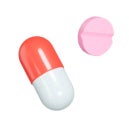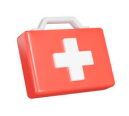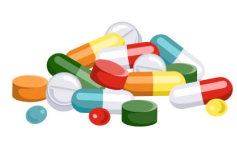Uses
What is Isotretinoin (for Acne) for?
Isotretinoin is used to treat severe acne that has not responded to other acne medications. It reduces the amount of oil produced by the glands in the skin and clears inflammation.
The medication may also be used for other conditions as determined by your doctor.
How should I take or use Isotretinoin (for Acne)?
Isotretinoin is available in the form of capsules. Take this medication as directed by your doctor. Swallow the capsules whole with a glass of water. Do not chew or crush the capsule. Take this medication with or after food.
What should I do if I forget to take or use Isotretinoin (for Acne)?
If you forget to take a dose, take it as soon as you remember. If it is almost time for your next dose, skip the missed dose. Then take your next dose at the usual time. Do not take two doses to make up for the missed dose.
Precaution
What precautions should I take when taking or using Isotretinoin (for Acne)?
Inform your healthcare professional if:
- You are allergic to this medication or any of the other ingredients of this medication.
- You have diabetes, high cholesterol or triglycerides (fat in the blood), liver or kidney disease.
- You are taking any other medications, including supplements, traditional medications and herbal remedies.
- You are planning to undergo any surgical or dental procedures.
- You are planning to undergo any skin or hair removal procedures e.g. waxing, dermabrasions, facial peels, laser treatments. This medication may cause skin to become more fragile, increasing the risk of poor wound healing and scar formation. Avoid these procedures during treatment and for at least 6 months after stopping the medication.
- You are planning to donate blood. Do not donate blood when taking the medication and for at least 1 month after stopping the medication. This is to prevent passing donated blood to a pregnant woman and causing harm to the baby.
- Isotretinoin has been reported to cause serious harm to unborn babies when taken during pregnancy. Women who are pregnant, who intend to become pregnant, or who are breast-feeding should tell their doctors before taking this medication.
- You must use strict birth control for at least 1 month before you start isotretinoin, for the whole time you are taking isotretinoin and for at least 1 month after discontinuing this medication. Discuss contraception with your doctor or pharmacist.
- Before you start taking your course of isotretinoin, you should wait until the 2nd or 3rd day of your next menstrual period. If you suspect you are pregnant, do not start the isotretinoin at all.
- If you are already taking isotretinoin and discover that you have become pregnant, stop taking it immediately and tell your doctor.
What food or medication should I avoid when I take or use Isotretinoin (for Acne)?
- Avoid taking alcohol when taking this medication as it can increase the level of triglycerides (fats) in your blood
- Do not take vitamin A supplements or multivitamins that contains vitamin A.
- Do not take this medication if you are on any tetracycline class of antibiotics (doxycycline, minocycline, and tetracycline). This can increase the risk of high pressure in the brain leading to headaches, nausea and vomiting.
Side Effects
What are some common side effects of Isotretinoin (for Acne)?
In some people, the acne may seem to get worse during the first few weeks before improving.
Certain side effects of this medication may happen and may even disappear during treatment. If any of the following effects persist or are severe, consult your doctor. These side effects include:
- Red, cracked and sore lips.
- Apply lip balm frequently
- Irritated and dry eyes.
- Apply eye-drops or artificial tears to prevent this. Stop the use of contact lenses if irritation persists.
- Dry skin, sometimes with peeling.
- Apply moisturiser regularly to manage skin dryness
- Dry mouth
- Drink more water or suck on sweets
- Dry nose. Nose bleeding may occur for severe cases.
- Apply white soft paraffin to the lining inside of your nose. If it does not resolve, consult your pharmacist or doctor about decreasing the dose of the medication.
- Increased risk of sunburn
- Avoid staying directly under sunlight for long durations. Use a broad-spectrum sunscreen product with Sun Protection Factor (SPF) of at least 30 and wear protective clothing when you are exposed to direct sunlight.
The following uncommon side effects may occasionally occur. Consult your doctor if any of them becomes severe:
- severe headache
- muscle and joint pain or stiffness - avoid strenuous exercise
- temporary hair loss
- severe diarrhoea
- nausea and vomiting
- dark urine or light-coloured stools, loss of appetite, stomach pain, yellowing of your eyes or skin
- dizziness
- blurred vision or changes in your vision (rare)
- mood changes including depression (rare)
Your doctor will also perform blood tests (cholesterol/triglycerides and liver function test) before you start the treatment and at least once during the course of treatment. This is to monitor for any abnormalities as isotretinoin can cause the level of cholesterol and triglycerides in your blood to increase and may cayuse raised liver enzymes.
The symptoms of a drug allergy include one or more of the following:
- Swollen face/eyes/lips/tongue
- Difficulty in breathing
- Itchy skin rashes over your whole body
If you experience any of these symptoms, you should stop your medication and see your healthcare professional immediately.
Handling
How should I store Isotretinoin (for Acne)?
- Keep away from children
- Keep in a cool, dry place, away from direct sunlight
How do I throw away Isotretinoin (for Acne) safely?
Pack this medication into a black trash bag and seal it tightly before throwing into the rubbish chute or bin.
Disclaimers
If you take more than the recommended dose, please seek medical advice immediately. The information provided on this page does not replace information from your healthcare professional. Please consult your healthcare professional for more information.
This article is jointly developed by members of the National Medication Information workgroup. The workgroup consists of cluster partners (National Healthcare Group, National University Health System, and SingHealth), community pharmacies (Guardian, Unity, and Watsons), and the Pharmaceutical Society of Singapore. The content does not reflect drug availability and supply information in pharmacies and healthcare institutions. You are advised to check with the respective institutions for such information.
Last Updated on October 2022

Need More Medicine?
Use Medicine Order Service on HealthBuddy.

Medicines Reminder
Get reminders and chart progress on HealthBuddy.




















